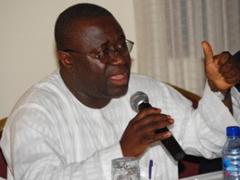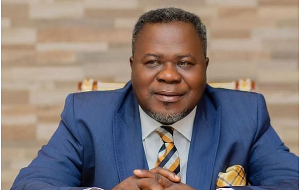- Home - News
- TWI News | TV
- Polls
- Year In Review
- News Archive
- Crime & Punishment
- Politics
- Regional
- Editorial
- Health
- Ghanaians Abroad
- Tabloid
- Africa
- Religion
- Election 2020
- Coronavirus
- News Videos | TV
- Photo Archives
- News Headlines
- Press Release
General News of Wednesday, 16 March 2016
Source: classfmonline.com
Securing borders won’t deter terrorists – Aning
 Security Analyst, Dr Kwesi Aning
Security Analyst, Dr Kwesi Aning
Security analyst and Director of the Faculty of Academic Affairs of the Kofi Annan International Peacekeeping and Training Centre (KAIPTC), Dr Kwesi Aning, has said that the country cannot fend off the terrorism threat it faces by securing its borders.
According to him that approach to combating terrorism was at odds with the ever-changing tactic employed by terrorists.
Dr Aning gave the advice in an interview with Chief Jerry Forson on Accra100.5FM’s morning show, Ghana Yensom, on Wednesday March 16, 2016.
“If anyone tells you to focus on borders, then the person does not understand the changing nature of the terrorist threat.
“If anything (act of terror) will happen, those who will commit the act are already here. The guns are already here, 2.3 million [of them]. They don’t need to bring in a gun across the border,” he told the host.
Dr Aning said Ghana was “one of the biggest importers of industrial explosives” in Africa – materials he said could be easily obtained from the market.
To buttress his point that securing the country’s borders would be an exercise in futility, as far as fighting terrorism is concerned, the security expert cited the example of the terrorist attack in Ivory Coast where the terrorists got in by sea. “So, when you send people to the borders and you arm the border guards, it just reflects that you are not up to speed with the reality of the challenge,” he stressed.
He called for humility and a shift in thinking on the part of the country’s security chiefs to ensure that the threat of an imminent terrorist attack is crushed.
“In Grand Bassam the terrorists came by sea, an open sea front. So, we shouldn’t suddenly rush to put armed men on every beach when there is a hotel. So, we need to think outside the box. Unfortunately, stone-pipe thinking is what drives this conversation around terrorism in West Africa.
“I think we should be humble and honest and ask: ‘What is the nature of the threat? Who are those who might want to do it? What do we need to look for in trying to identify…and to prevent?’”
According to him, the matter of the possibility of a terrorist attack on Ghana began surfacing six to seven years ago, and when some persons, including him, sounded the alarm, some security capos accused them of creating fear and panic.
“So we’ve looked at this thing wrongly and we are still looking at it wrongly,” he warned.










